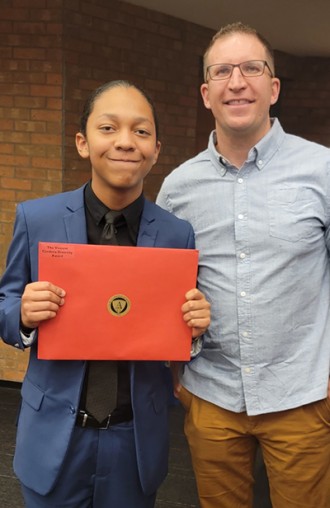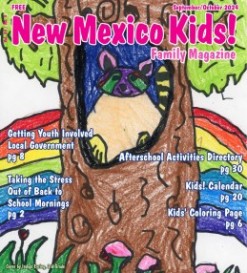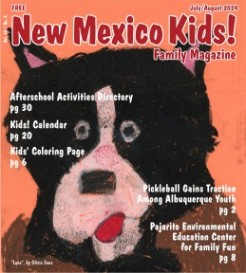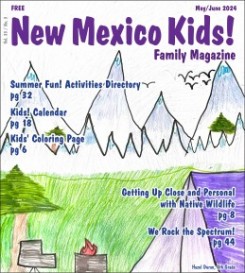Mentorship Program Provides Children with Life-Changing Besties Through ‘Bigs’
Mentorship Program Provides Children with Life-Changing Besties Through ‘Bigs’
January 6, 2025By AUTUMN GRAY

Parents, close your ears. This is a story for children and teens who have ever wished they had an adult who “got them.” Who they could trust and rely on. Who they could just hang out with. Who didn’t come with the complexities of family but who somehow still felt like home. Big Brothers and Big Sisters of Central New Mexico can provide that.
As the nation’s largest donor- and volunteer-supported mentoring network, Big Brothers Big Sisters makes monitored matches between adult volunteers ("Bigs") and children ("Littles"), creating lasting, meaningful relationships that help young people achieve their full potential. With January being National Mentoring Month, there’s no better time than now to see if Big Brothers Big Sisters might be for you.
“It’s introduced me to a lot of new things … and allowed me to get away from my (three) siblings,” 13-year-old Enzo Dominguez said of his 14-month relationship with his Big, Andy Tibble. “I am definitely able to talk with him. He’s able to understand me more, I guess, and we actually have a lot of common interests.”
Enzo and Tibble are both energetic and into sports and the outdoors. In the nine hours per month that they spend together, the two often play soccer, shoot hoops on a park basketball court, hike with their dogs, attend library events – and almost always eat.
It’s no accident that they share so much in common. Big Brothers Big Sisters pairs Bigs with Littles using a proven matchmaking program and only after rigorous background checks and screenings for safety has been conducted. Matches are also tracked to ensure they work out.
“It is taken very seriously,” said chief program officer Deeana Sauceda, herself a Big. “We look at the interests of the volunteer and the child – if they both like arts and crafts, or gaming, or want to become a film maker. We really like to match based on interests.”
Anyone between the ages of 6 and 14, from anywhere in the state can apply to be matched with a big brother or sister. Littles and their matches receive organization support through age 18. Enrollment has nothing to do with family income, or whether a child is undergoing some kind of crisis, or struggling with classes. Though much of Big Brothers Big Sisters’ grant money is to support children in single-parent homes, who have incarcerated parents, are in failing schools, have learning or mental health challenges, or are immigrants or refugees.
The only qualification for a child to enroll to be a Little is that their family wants some extra support from another adult in their child’s life, Sauceda emphasized. All programs are provided at no charge.
“We are open to all children because every child can benefit from a mentor,” she said.
Enzo, for example, gets excellent grades, is cerebral by nature, and lives in a stable and loving household. However, after Enzo’s father died in 2017, his mother, Christina Rain, recognized he needed a supportive male figure in his life. Having worked as a program manager for match support with Big Brothers Big Sisters in the past, she was well aware of all that a Big could provide her son.
“As a single mom feeling spread thin and trying to give my kids the individual attention they deserve - I know I can’t always do that. Big Brothers gives my children undivided attention,” said Rain, whose other three children also have Bigs. “They go out with their Bigs, and they come home happy and kind of glowing, if you will. It’s been such a positive experience.”
At the very least, enrolled youths gain a close friend or an additional person to support them. However, Big Brothers Big Sisters statistics show that nine of 10 in the organization’s mentoring program will also graduate from high school, and eight of 10 will want to go to college. They are therefore focused on making good choices, avoiding risky behavior and violence.
“The goal is for kids to reach their full potential and have a plan when they’re ready to leave high school,” Sauceda said. “With our youth today and the challenges they face, they need us more than ever to step up, especially when so many things are influencing them and they’re having to make important choices.
“Sometimes they don’t want to talk to their parents, so what are their sources of information? Is it Instagram? Is it Tik Tok? Is it their peers? Having a caring adult around makes such a difference.”
National research has shown that positive relationships between Littles and their Bigs have a direct and measurable impact on children’s lives, according to the organization’s website, https://www.bbbs-cnm.org/. By participating in its programs, Little Brothers and Sisters are shown to be:
• more confident in their schoolwork performance;
• able to get along better with their families;
• 46 percent less likely to begin using illegal drugs;
• 27 percent less likely to begin using alcohol;
• and 52 percent less likely to skip school.
Parents can also feel confident that their children are in good hands. All volunteers must fill out an application, agree to a background check and fingerprinting, provide references, and be interviewed. The whole process can take two to four months for a volunteer to be accepted as a Big and matched with a Little.
Indeed, Rain said she had some concerns about who Enzo might be matched with, but those were unfounded: “That was one of my fears. I didn’t want him to be let down. But if Andy says he’s going to be here Sunday at 2 o’clock, he’s here knocking on the door at 2 o’clock. Not one time has he ever let down Enzo.”
Big Brothers and Big Sisters has been supporting youth and families nationwide for 120 years and in New Mexico for 55 years. Statewide, 1,000 youths have a Big through the nonprofit. In Albuquerque, 400 children have big sisters and about 200 have big brothers.
To enroll to have a Big in your life, contact enrollment intake coordinator Gary Jones at gary.jones@bbbs-cnm.org or call (505) 480-6185. For more information, visit https://www.bbbs-cnm.org/enroll-a-child/.





